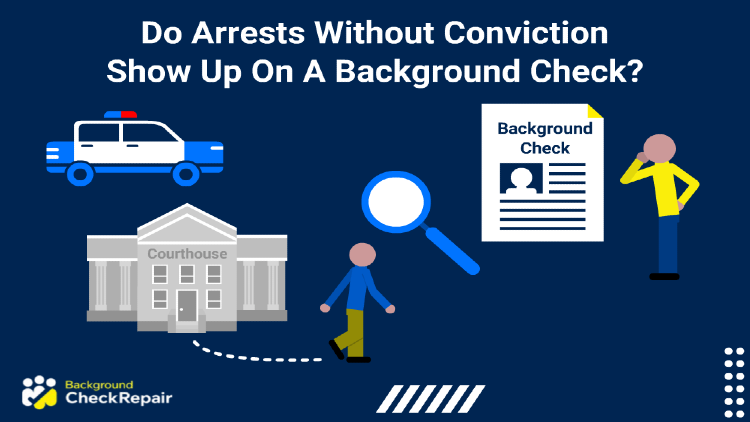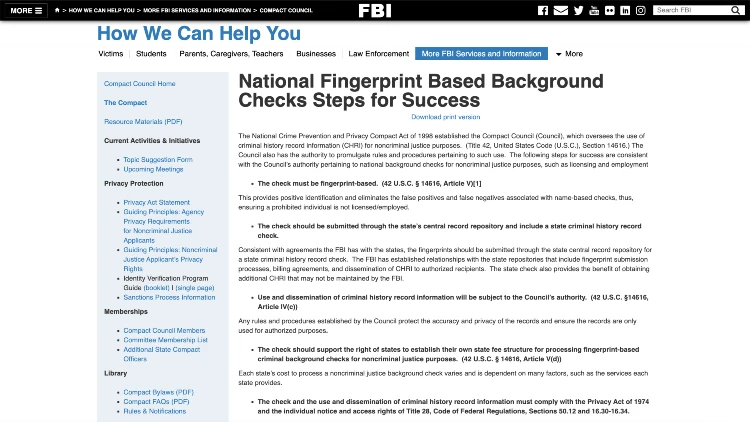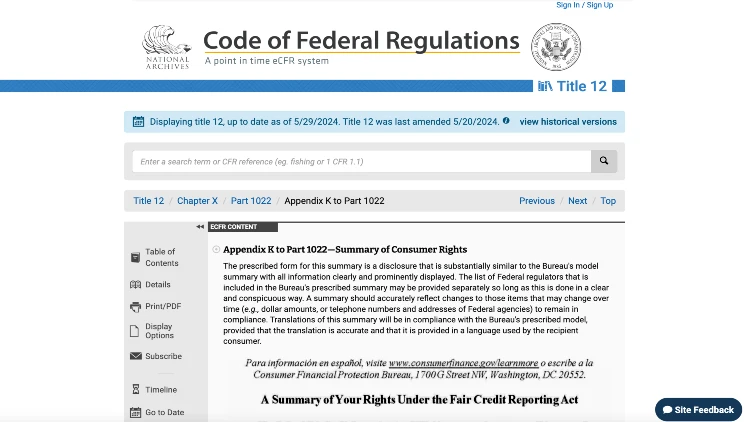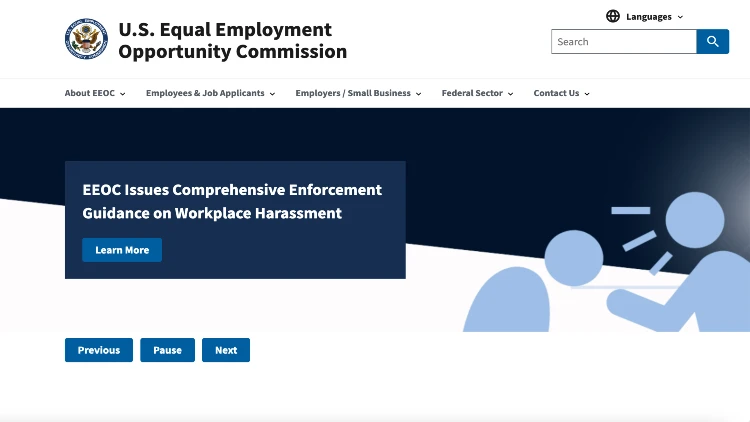We use cookies to ensure that we give you the best experience on our website. If you continue to use this site we will assume that you are happy with it
Do Arrests Without Conviction Show Up on Background Check? Yes & No
 Written by Background Check Repair
Written by Background Check Repair
Background Checks | June 3, 2024

Table of Contents
When you’re applying for a job, you may find yourself asking, “Do arrests without conviction show up on background check?”
It’s reasonable to be concerned about what your criminal history record will tell prospective employers, especially if you’ve been arrested before. However, if you don’t have a conviction record, or if the charges were dropped, you would think that you’d have a clean record. Unfortunately, that isn’t always the case and sometimes arrests without convictions will show up…and sometimes they won’t.
Depending on where you live, you may still have to deal with a stain on your record, even if you have no convictions. Each state has varying laws about what can and can’t show on your background checks and records, as well as differing rules about what a hiring employer may or may not do about it.
Will My Arrest Record Appear on a Background Check or Background Screening Even if I Wasn’t Convicted?
Because each state has its own set of laws regarding a person’s criminal history, it’s understandable to feel uneasy about what your own record history may contain. It’s helpful to know ahead of time if you have a black mark showing up on your background check so that you can get ahead of the game when you’re looking for a job. You may either want to be prepared to forewarn a potential employer about what they may find, or you may decide that it’s best to simply avoid applying for certain types of jobs.
So, do arrests without conviction show up on background check? The short answer to that is yes. And no. Maybe? Each state approaches the subject of arrests without convictions differently. Unfortunately, most states do include legal information on arrest records, even if they never resulted in convictions. Across the country, arrests do show up on background checks. Arrest records are a part of public records, so the information is there for anyone to find, should they choose to look for it. You may also want to know whether you’ll still have a record even if criminal charges are dropped.

(Image: FBI4)
Take a look at the various ways that states handle background checks. So, what exactly is included in background checks? Again, this varies from state to state. Most states provide personal information, such as date of birth, physical description, and address. They can also include information about crimes charges and convictions, sentencing, case dispositions, and some states also include parole information and post-conviction information and so arrests do show up on background checks.
Some parts of the country will allow employers to review arrest records, including those with no conviction, and incorporate them into their decision-making process. However, other parts of the nation do not even allow employers to see arrest records. And then, some states find a middle ground, permitting the use of arrest records under specific instances and having different standards regarding expunged and sealed records or when a person was arrested.
The states that have no restrictions whatsoever regarding arrest records are:1
- Alabama
- Alaska
- Arkansas
- Colorado
- Connecticut
- Delaware
- Florida
- Idaho
- Illinois
- Indiana
- Iowa
- Kansas
- Kentucky
- Louisiana
- Mississippi
- Missouri
- Nebraska
- New Hampshire
- New Mexico
- North Carolina
- North Dakota
- Ohio
- Oklahoma
- Rhode Island
- South Carolina
- South Dakota
- Tennessee
- Utah
- Vermont
- Virginia
- West Virginia
- Wyoming
- Washington, D.C.
These states don’t expressly forbid employers from looking at arrest records, but instead, it’s illegal for them to ask about them and deny employment based on background checks:
- Arizona
- California
- Hawaii
- Maine
- Massachusetts
- Michigan
- Montana
- Nevada
- New York
- Pennsylvania
- Wisconsin
These final states allow employers to consider an arrest, but only if they meet certain circumstances. For example, if an applicant in Georgia is a first-time offender, the employer may not factor in their arrest record history in their hiring decision.
- Georgia
- Maryland
- New Jersey
- Oregon
- Washington
- Texas
Is It Legal To Be Denied Employment Because a Background Check Contains Records With an Arrest That Doesn’t Show a Conviction?
Many people debate whether it’s appropriate to use a person’s arrest record history against them, whether for a job or any other reason. After all, an arrest is not evidence of an individual’s guilt of breaking the law. So why do arrests without conviction show up on background check, many people argue. The good news is that you do have some federal legal protection, and your own state may offer further protection of your background checks employment legal job rights.
The Fair Credit Reporting Act (FCRA) makes it legal for employers to consider a person’s arrest record information when denying them employment. The law states that employers are allowed to perform a background screening on you, which may include criminal background checks. They need to notify you and obtain your written permission if they intend to do this. If you get negative background check results after an employment offer, the company must provide you with a Summary of Rights so that you may contact the reporting company in case you think they’ve made an error.2 When you contact the agency, they will share their background check results with you. If their information is wrong, you’ll have the opportunity to correct it.

(Image: Code of Federal Regulations5)
The Equal Employment Opportunity Commission (EEOC) offers legal guidelines to employers regarding the use of criminal background checks. Under Title VII of the Civil Rights Act of 1964, an employer may not discriminate in hiring practices, including using criminal records obtained from background checks. Background checks do not automatically disqualify you.
If the EEOC determines that an applicant was discriminated against because of their criminal record, the EEOC can pursue punishment against the employer. Admittedly, it’s a fine line to discern, and proving discrimination may be a challenge. Penalties could include a hefty fine and punitive damages for the applicant.3
Many employers aren’t even sure do arrests without conviction show up on background check. Employers don’t typically perform the background check themselves; they hire a private company specializing in retrieving and organizing this type of information. The private company checks records from the courthouse and any other source of public records. Therefore, if an arrest record is out there, you can assume that the private company will find it. Whether they are included or not in your report is another matter. Some private search companies will exclude arrest records in order to follow EEOC guidelines and because each state’s law varies.
What’s the Difference Between a Criminal Background Check, Fingerprint Background Check, and Employment Background Check?
There are a few different types of background checks that are possible. Depending on who is conducting your background check, they may be any one of the following.
- Criminal background checks
This is the most common sort of information to include in any background check. These use the candidate’s personal information to search public records for information on convictions, including felony and misdemeanor. They’ll most likely include incarceration information and may even have any arrests where prosecution is still pending. So if you’re wondering whether a record check can reveal unsettled court cases, they most likely do. And again, depending on which state you live in, previous bookings that did not end in a conviction may also appear.
- Employment background checks
An employment background check is more comprehensive than solely a criminal background check. Employers are held to specific laws when performing background checks, so pay attention that they’re following background check laws. You’ll find criminal history in it, but other information such as verification of things like previous employment and education records. For example, if the job is centered around driving, the check may include driving records and drug testing.

(Image: U.S. Equal Employment Opportunity Commission6)
- Fingerprint background checks
A fingerprint background check often involves running the person’s fingers through the FBI database to search for pertinent law records and information. These files will turn up any criminal history they have related to your fingerprints. When running background checks employers may prefer this type of check since it is less likely to include errors in reporting the information, as it’s unlikely to mix up people’s fingerprints the way you can mix up their names.
Background Checks, Arrests, and Convictions and How They Affect You
Here are some more things you may want to know about this topic.
How should I handle bad background check reports?
If you know ahead of time that a background check will reveal a run-in with the law, your best bet is to get out in front of that news. First, be honest with your potential employer about what happened when you broke the law, and then try to paint it in a positive light as best as you can.
For example, you can tell them that you regret what happened and have learned a valuable lesson and why the experience has made you a better person. They may appreciate that information. You can also contact a lawyer if you feel like you were discriminated against for employment. Attorneys can file the proper defense or help you clear your history with a defense strategy that uses the right code.
When should I contact an attorney?
Contacting an attorney can help you speed up the process of removing any information that comes in from the check, which is false or should be removed.
Can I still get a job if arrested but not convicted?
That depends both on the law where you live and the employer. If you live in certain states, they aren’t allowed by law to take your unconvicted arrest into account, if they even know that information in the first place.
Other state laws allow employers to reject applicants with any sort of arrest history, regardless of convictions. So in those states, you’d have to rely upon an employer being non-judgemental or hire an attorney. The good news is that many employers don’t have a problem with an arrest on somebody’s record, especially if they are a great candidate otherwise. So you may not even need to worry when you’re trying to figure out do arrests without conviction show up on background check.
References
1Background Checks. 2021. Employment Background Checks and the Use of Arrest Records by State. Learning Center. 15 November 2021. Web. <https://www.backgroundchecks.com/learning-center/employment-background-checks-and-the-use-of-arrest-records-by-state>
2Federal Trade Commission Consumer Information. 2021. Background Checks. Articles. 15 November 2021. Web. <https://www.consumer.ftc.gov/articles/0157-background-checks>
3Swartz Swidler, LLC. 2019. What Happens When The EEOC Determines That An Employer Is Guilty. 15 November 2021. Web. <https://swartz-legal.com/what-happens-when-the-eeoc-determines-that-an-employer-is-guilty/>
4Federal Bureau of Investigation. (2014, Nov). National Fingerprint Based Background Checks Steps for Success. Federal Bureau of Investigation. Retrieved Jun3, 2024, from <https://www.fbi.gov/how-we-can-help-you/more-fbi-services-and-information/compact-council/national-fingerprint-based-background-checks-steps-for-success>
5Code of Federal Regulations. (2023, Aug 25). Appendix K to Part 1022—Summary of Consumer Rights. Code of Federal Regulations. Retrieved Jun3, 2024, from <https://www.ecfr.gov/current/title-12/chapter-X/part-1022/appendix-Appendix%20K%20to%20Part%201022>
6U.S. Equal Employment Opportunity Commission. (n.d). U.S. Equal Employment Opportunity Commission Homepage. U.S. Equal Employment Opportunity Commission. Retrieved Jun3, 2024, from <https://www.eeoc.gov/>
